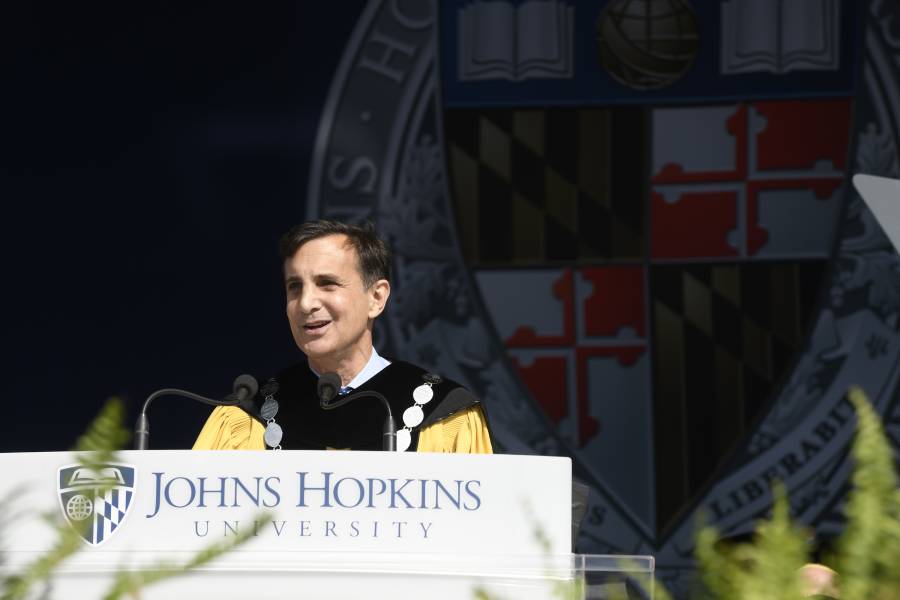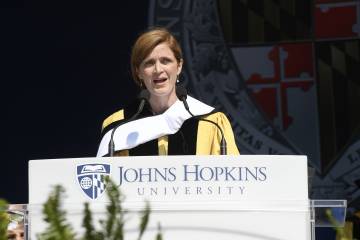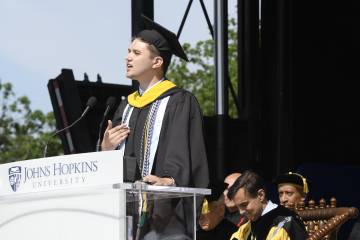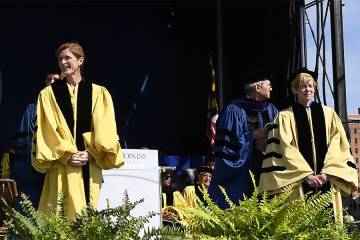Remarks prepared for delivery by Johns Hopkins University President Ronald J. Daniels at the universitywide Commencement ceremony on May 23, 2022.
Under truly perfect skies with moderate temperatures, with soaring spirits, boundless pride, and the delay that allowed for two, not one night of pre-Commencement partying, I am delighted to be able to say, "Good morning, Johns Hopkins Class of 2022!"
I am truly overjoyed to be here with all—live—on our historic Homewood field.
To our alumni and trustees; to our faculty and staff; to our parents, family members and friends; to our distinguished speaker, Samantha Power; and most especially to our graduates … welcome to the Johns Hopkins University Commencement for the great, great Class of 2022!
You, Class of 2022, are a brave and persistent group who have guarded the flames of student life during a period of incredible, unprecedented disruption.
You know that the A-Level of the MSE should never sound like this: [Picture of the Milton S. Eisenhower Library's A-Level with crickets chirping in the background]
... But always like this: [Clip of party from The Office]
You have embraced the rich, complex flavor profile of the FFC's famed "cheeseburger soup," the secrets of which I am sworn never to reveal.
And some of you are even brave enough to streak through Brody during finals.
(Mercifully, there are no visuals on the jumbotron that will be shared for that particular Class of 2022 milestone).
We know well that your class has had to summon real fortitude to weather a once-in-a-century pandemic that upended life across the planet and here at Hopkins. And if that weren't enough, your undergraduate experience coincided with a cascade of political and social upheavals at home and abroad.
But there is no doubt that you have all acquitted yourselves remarkably well under these immense pressures. It hasn't been easy.
It takes a lot to rise to the occasion.
Not everyone meets their moment—but some do. And they do so with staggering audacity and courage. With steely determination. With preternatural composure.
In this moment, of course, we can't help but be awestruck by the resolve shown by Ukrainian president Volodymyr Zelensky.
A year ago, few in this country likely could have named the president of Ukraine.
Today, for good reason, he is ubiquitous.
Since March, Zelensky has spoken stirringly on behalf of his country, to the United Nations.
He has addressed parliamentary bodies throughout the world, including our own Congress.
And earlier this week he even made a visit to that most august body ... the Association of American Universities, where he addressed a group of university presidents and provosts—myself included.
At that meeting, President Zelensky continued his campaign to shore up the Western coalition and to underscore the incredible stakes of the battle he and his fellow citizens are waging.
It was inspiring to witness up close the strength of his character; a strength that has summoned the best of his fellow-citizens and caused so many across our planet to praise him not only for his courage and tenacity but for the ways in which he has rekindled our sense of what is possible for democracies throughout the world.
Yet watching Zelensky speak was also an important reminder to me that, by his own admission, he is simply a person doing a job to the best of his ability. Indeed, at his own inauguration in 2019, with eerie prescience, Zelensky reminded his fellow Ukrainians that "the president is not an icon" or "an idol."
That's easy to forget, since he seems to have set the land speed record for the unlikely transformation from slapstick comedian to national president to global hero.
But while heroes, both in our time and in times past, can inspire us, we also know that their stories can paralyze us.
Our veneration of our heroes makes their choices, their actions seem otherworldly and elusive. It dulls our own capacity to see the ways in which we, too, are capable of choices—hard choices—that have heroic dimensions.
Choices that are made quietly and without fanfare. Choices that draw on our deepest principles and values. Choices that may entail hardship, loss or pain on us, and yet benefit others.
Such choices are not to be undervalued.
In fact, I owe my life to such heroism.
Now, some of you may have heard me reflect before on the story of my family's dramatic journey from Poland to Canada on the eve of the Second World War. The story clearly is a touchstone for me and for my siblings.
As a child, I understood this story as a tale of pure good fortune. And today, I hear it a little differently, because, as is so often the case, there is always more to the story.
Here is how it goes.
In the fall of 1938, my grandfather lost his job as a teacher in Warsaw, Poland, and reluctantly decided to apply to join his two siblings who had earlier made the journey to Canada.
Though the odds were very long against him, by the end of 1938, he learned that he alone had secured one of the fewer than 5,000 visas that the Canadian government would extend to Jewish refugees during the 12-year period of the German Third Reich.
Plans were set.
My grandfather would leave for Canada in early 1939, establish himself in the new country, and then a few years later would send for my grandmother and their three children—my aunt, my uncle, and of course, my father.
Had the plan been followed, my father, then a 7-year-old boy, surely would have been one of the 6 million Jewish people who perished in the Nazi Holocaust.
But for the intervention of one woman.
A travel agent, who was a complete stranger to the family.
A travel agent who was helping my grandfather's Canadian family book his passage.
A travel agent who, upon learning that my grandfather had secured one of the precious visas conferred on European Jews by the Canadian government and was convinced that the swirl of events roiling Europe would be cataclysmic for its Jewish population, urged that the family reconsider the plan.
The travel agent advised that my grandfather should delay his passage, appeal directly and urgently to the Canadian government for four additional visas. Then, quite extraordinarily, when the visas were granted, and it was clear that the family had no financial capacity to pay for the four additional steamship tickets, she personally loaned them the money to secure their flight.
For decades, that travel agent, at least for me, remained nameless.
Until one day about 20 years ago.
I remember the day so vividly.
I was having lunch with an older academic colleague in an open-air café in Toronto. After a spirited conversation that focused on a range of different legal topics, he changed the subject abruptly, and almost out of nowhere asked whether there was any kind of special story about how my family came to Canada. Further, by any chance, did a travel agent figure in that account?
It turned out that the academic colleague who was seated across the table from me was the grandson of that travel agent.
Her name was Dorothy Dworkin.
Mrs. Dworkin, I learned, was an almost legendary figure in the Canadian Jewish diaspora.
After immigrating from Latvia at the turn of the 20th century, she became a nurse who tended to Jewish women across the region. Later, she founded Yiddish newspapers and helped to build Jewish hospitals. And she always sought to support her community, including by bringing immigrant families to safe harbor.
Dorothy Dworkin was living proof that heroism does not always have to be larger than life.
It can manifest itself in the offer of wise counsel. Or quiet financial assistance. Or a decision to speak (or act) in defense of others.
But in the right circumstances, these seemingly mundane actions possess the potential to change profoundly the trajectory of the lives of others. The lives of people you know, and, as in my family's case, the lives of those you don't.
Today, Class of 2022, you are about to leave us.
Some of you are moving on to your first job, others to pursue graduate degrees where you will encounter new people, new communities, new opportunities to make an impact.
And if the last several years are any indication, the world will not cease from throwing in your path challenges requiring you to stand up for your most cherished values, beliefs, principles, and dreams.
My hope—and the hope of so many of us here at Johns Hopkins—is that you will remember in those moments that heroism takes many forms.
Be inspired, not intimidated by the stories of others.
Never let impostor syndrome, which we all suffer from, get the better of you.
You have the courage, fortitude, and humility required to meet the moments of history that lie before you.
I know, we all know, because we have seen you do it.
Our world needs all kinds of heroes.
And it needs every single one of you.
Class of 2022, congratulations again. We're so proud, and Godspeed!
Posted in University News, Student Life
Tagged class of 2022, commencement 2022











